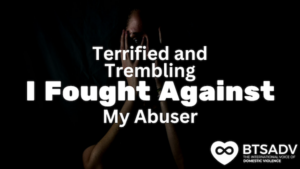He tried to take her voice, but he only made it louder and stronger
She awoke in the cold, naked, shivering, in pain and slightly unaware of her surroundings. She knew she had to escape and that he was nowhere to be seen. Jumping an eight-foot retaining wall to get to the other neighbors, breaking her foot in the process. Tara had lost too much blood and lost count of how many times she had lost consciousness from his hands strangling her. She needed somebody, anybody who would help her and call 911. She wished someone had been advocating for safety planning at that moment. Something to help her when she needed it most.
“He took away so much from me that night,” she said. “Speaking up in court was gaining a little bit back of what he took from me.”
A new beginning
What seemed like the end of Tara Loo’s story, turned out to be only the beginning. That cold night in December 2009 was when she started her recovery road from victim to survivor. When she awoke in the hospital that she had two choices to make. She could either continue to be a victim, play the “poor me” card and head down a self-destructive path or she could get therapy and start on the road to recovery. She chose the latter.
“I thought, ‘What can I do to make this better?’ ” she said. “I instantly knew I’m gonna need therapy for this, like there’s no way I’m gonna take care of this without therapy.”
Advocacy became her voice
While it hasn’t been easy – multiple surgeries, traumatic brain injury, permanent nerve damage in her hand, short term memory loss, extremely visual nightmares, a hoarse voice, sore throats every morning, chronic light headedness, difficulties swallowing and permanent scarring on the inside of her throat. Tara has found a voice within herself that is stronger than ever before, advocating for safety planning for victims.
Her ex strangled her so much that he popped blood vessels in both of her eyes. Her face was red, bruised and swollen but he never once touched her face. All of that damage done from strangling her. She said at one point, she heard him say something about her having black eyes and that no one would believe him. She didn’t realize until later that the bruising from the strangling had already started to show on her face and he saw it.
Trying to escape
He didn’t want her in this world anymore because he couldn’t have her. The night he strangled her, she had broken up with him and told him to move out. He had attacked her in her sleep. The most dangerous time for a victim is when they’re trying to escape their abuser, according to the Bureau of Justice Statistics National Crime Victimization Survey. The abuser figures that the only way to keep them is to kill them. Tara tells victims that their partner has the ability to harm them physically when verbal abuse is present.
“If your partner has strangled you in the past, your risk of being killed by them is seven times higher,” according to the National Domestic Violence Hotline.
It can take weeks for symptoms to manifest from strangling. It’s important to get checked out when you’ve been strangled because you could have no symptoms but have brain damage from lack of oxygen. Not only is it physically harmful but strangling is an intimate form of power and control. Tara’s ex tried to exert that over her. Now Tara advocates for victims of DV and has taken the control back.
Finding support
She’s using that voice to raise awareness about the prevalence and gravity of domestic violence, to speak to teens at high schools, to advocate for victims whether that’s in the court room, hospital or the shelter. She worked for years as a confidential victims advocate including taking advocacy training classes. Then she found Break the Silence and within that, a family of survivors. She is open with her teen daughters and warns them about teen dating violence. Together they are advocating for safety planning and against DV.
“My sisters were my strength . . . they were the reason I survived,” Tara said. “They were the reason I fought to live.”
Tara’s strength is what pushes her to use her voice. She openly talks about her story and isn’t ashamed of it because she knows others are scared and that her story could help them.
“If my story and my situation can prevent one man from hurting the girl he loves, can prevent one girl from going through what I went through, then I’m able to see the positives and not even look at my situation in a negative way,” she said.
Tara jokes that, in a weird way, that day was both the best and worst thing to happen to her. Positive things have come from it. She wants others to see they are worthy of being loved and respected.
“Being in an abusive relationship, you completely lose the person that you are,” she said. “It destroys your sense of self.”
She longs to see other victims reach the point where they feel like a survivor and know they have worth. That’s why she stresses the importance of safety plans, so you can get out, survive then thrive. She suffered more injuries because she didn’t have a safety plan. She wants others to know to make a plan because sometimes it’s the difference between life and death.
STEPS TO MAKE A SAFETY PLAN:
These tips come from The National Domestic Violence Hotline:
- Keep a bag with essentials in it especially in case you leave in a hurry – identification such as driver’s license and social security card, legal papers such as protective orders and records, emergency numbers, cash, clothes, any medication, pay-as-you-go cell phone, etc.
- Keep any evidence of physical abuse, such as pictures of injuries.
- Keep a journal of all violent incidences, noting dates, events and threats made, if possible. Keep your journal in a safe place.
- Know where you can go to get help. Tell someone what is happening to you.
- If you are injured, go to a doctor or an emergency room and report what happened to you. Ask that they document your visit.
- Plan with your children and identify a safe place for them, like a room with a lock or a friend’s house where they can go for help. Reassure them that their job is to stay safe, not to protect you.
- Contact your local shelter and find out about laws and other resources available to you before you have to use them during a crisis. WomensLaw.org has state by state legal information.
- Acquire job skills or take courses at a community college as you can.
- Try to set money aside or ask friends or family members to hold money for you.









